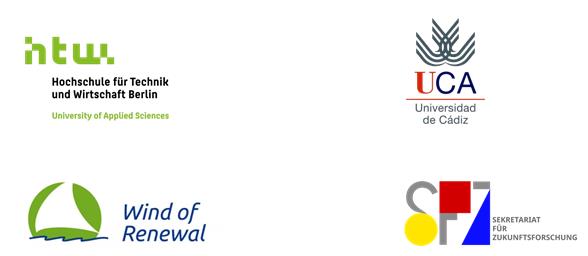A Study in Greece and Southern Spain
The following study is a result of the project “Zukunftschancen Energiewende und Klimaschutz” (ZEWKlima), realised in Winter 2017/18. It was financed by the European Climate Initiative (EUKI). EUKI is a project financing instrument by the Federal Ministry for the Environment, Nature Conservation and Nuclear Safety (BMU).[1]

- The project was realised by the following organisations:
- Hochschule für Technik und Wirtschaft, Berlin
- Universidad de Cádiz, Spain
- The Greek NGO “Wind of Renewal”, Athens
- Sekretariat für Zukunftsforschung, Berlin
[1] It is the overarching goal of the EUKI to foster climate cooperation within the European Union in order to mitigate greenhouse gas emissions. It does so through strengthening cross-border dialogue and cooperation as well as exchange of knowledge and experience. The information and views set out in this report are those of the authors and do not necessarily reflect the official opinion of the Federal Ministry for the Environment, Nature Conservation and Nuclear Safety.
Research and elaboration:
Prof. Francisco Sanchez de la Flor, Nikos Chrysogelos, Dr. Hartwig Berger, Prof. Dr. Rolf Kreibich, Yassin Bendjebbour, Maja Andreou, Eva-Maria Gonzalez Guerrero, Raquel Valle Macías, Birgitta Kinscher, Dr. Simone Becker
Responsible for the text:
Dr. Hartwig Berger, in cooperation with Yassin Bendjebbour
1. Introduction
Youth unemployment in southern and eastern European countries is catastrophic and the resulting uncertainty and lack of prospects forms a heavy burden for young people. Its potential consequences might call into question the entire future of the European Union (EU).
To undertake serious steps to, at least, alleviate this scandalous situation, young people need to be trained and employed in vocational fields that are important for the sustainable development of the EU and thus offer a viable future for these young people and for the EU itself. One of these vocational fields is the development of a climate-friendly, modern and decentralized energy supply based on efficiency, economy, renewable resources and storage technology. This was once again underlined by the commitments entered by the EU at the Paris climate conference (COP21).
